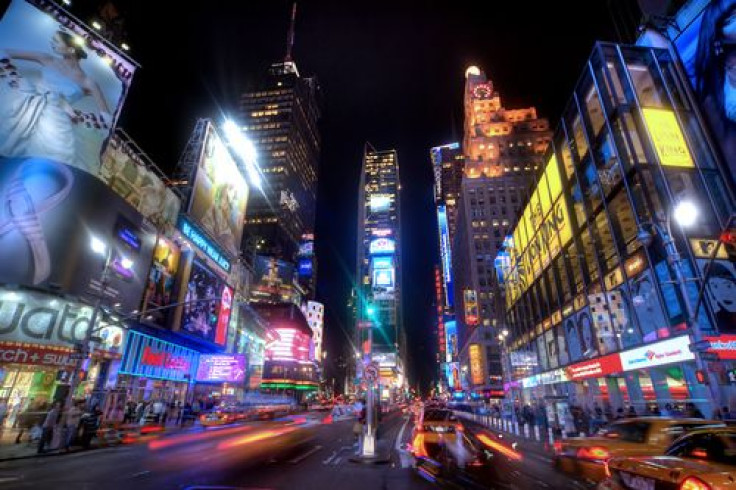Sleep Deprivation Plagues These Cities Most, Says Fitness Tracker Data: Why Urban Bedtimes Suffer

Sleep is one of the three pillars of health alongside exercise and nutrition, so why do Americans keep treating it as if it’s a place to borrow time from? A new tracking device has served itself as a useful tool for people to get back on track or maintain their already healthy lifestyle, but it has also provided the makers a wealth of information to analyze and categorize the worst and best sleepers in the world.
Jawbone, the maker of wireless headsets and wristbands recently joined the long list of wearable food-logging technology, and has also added the component of tracking sleep and wake times. The band, which has been named UP was released a month ago and is used to track food, drink, the amount of steps taken, and overall activity as you go about the ins and outs of your day, in addition to its unique sleep tracking feature. It also includes an “insight engine” that tells its wearer how the overall food consumption and sleep schedule work together to affect your health.
After the company collected the data of tens of thousands of its users and broke it down through a cohesive graph, the numbers revealed the cities that are getting the least amount of sleep. Research has told us time and again that Americans aren’t getting enough sleep. However, when sleeping hours are clocked in and added up it shows every single major city in the United States is sleep deprived.
The survey’s registered users logged in that they were getting an average of 6.8 hours of sleep, which is less than the seven to eight hours of sleep per night, recommended by the Centers for Disease Control and Prevention. Numbers came in just short of health recommendations throughout the country’s 21 major cities along with 24 international cities from Melbourne, Australia to Tokyo, Japan. Is there something about the city life that just keeps us up at night, or does it have to do with the types of people the city attracts? The figures are too fresh to be sure if there’s a causal or correlative effect here, meaning is it just the type of person that wants to pay thousands for a closet space of living space, or is there something about that living space that’s causing sleep deprivation?
The city design creates the perfect atmosphere for all-nighters and is no friend to sleepers and children. The part of your brain that cues the rest of your body to go to sleep is controlled by the suprachiasmatic nucleus, and is attached to your optic nerve. With the bright lights of the city, it’s understandable why it’s harder to shut down and fall asleep as soon as your head hits the pillow.
Black out shades are imperative, but they won’t help block out the sirens or the loud laughter that floods the streets from late night bar hoppers who are welcomed to warm barstools until 4 in the morning. Soft background music can help and other useful sleep setup tricks, but that won’t help keep you from your alarm clock that’ll wake you up bright and early to beat the morning commute through the subway and busily-packed streets. It’s all a balancing act of the three pillars, and it turns out every major city in the world is dropping the ball when it comes to sleep.
The UP band recorded Tokyo residents sleep an average of five hours and 46 minutes, and are one of the last to fall asleep and first to wake up. London, on the other hand, gets an average of six hours and 54 minutes of sleep a night, which is an hour more than Tokyo, and Rome, Italy is right behind them, clocking in an average of six hours and 49 minutes a night. New York City is a couple minutes shy of meeting their sleeping average, with six hours and 47 minutes a night.
It was only last year that the National Sleep Foundation conducted the first International Bedroom Poll that explored sleep differences in six different countries. Americans and the Japanese reported an average of six hours and thirty-one minutes and six hours and 22 minutes, respectively, which ranks them getting the least amount of sleep out of Canada, Mexico, the United Kingdom, and Germany. In the end, the Foundation’s numbers brought them to the conclusion that less than half of the people in most countries get a good night’s sleep.
U.S. Cities Clocking In Most To Least Sleep On Average:
- Orlando, Fla: 6hr, 56min
- Austin, Texas: 6hr, 54min
- Dallas, Texas: 6hr, 54min
- Denver, Colo.: 6hr, 54min
- Minneapolis, Minn.: 6hr, 54min
- San Diego, Calif.: 6hr, 54min
- Seattle, Wash.: 6hr, 53min
- San Antonio, Texas: 6hr, 52min
- Charlotte, N.C.: 6hr, 51min
- Washington, D.C.: 6hr, 51min
- Boston, Mass.: 6hr, 50min
- Chicago, Ill.: 6hr, 50min
- Houston, Texas: 6hr, 49min
- San Francisco, Calif.: 6hr, 49min
- Atlanta, Ga.: 6hr, 48min
- Phoenix, Ariz.: 6hr, 48min
- San Jose, Calif.: 6hr, 48min
- New York, N.Y.: 6hr, 47min
- Miami, Fla.: 6hr, 43min
- Los Angeles, Calif.: 6hr, 41min
- Las Vegas, Nev.: 6hr, 32min



























